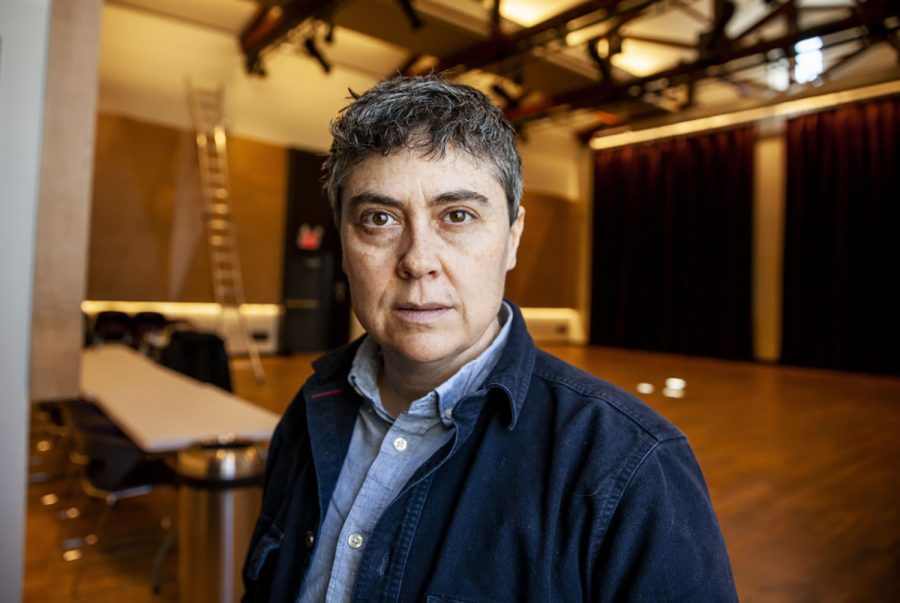UI alum Andrea Lawlor wins Whiting Award for debut novel
2020 Whiting Award Winner Andrea Lawlor discusses their novel, the importance of books in a time of chaos, and the encouragement they felt from winning this prestigious award.
March 26, 2020
Even in the midst of a pandemic, the literary world still spins on its axis. On Wednesday, UI alum and fiction writer Andrea Lawlor was among 10 winners of the 35th annual Whiting Awards.
Lawlor won the award for their debut novel, Paul Takes the Form of a Mortal Girl. Each year, the 10 winners receive $50,000 each. The winners were announced on Facebook and Twitter, due to the ceremony’s cancellation to avoid possible COVID-19 transmission.
The judges described Andrea’s work as, “mythic and gritty, lyric and witty, brazenly dirty and teeming with life” and whose debut novel is “at once a bacchanalian celebration of outlaw living and an old-fashioned bildungsroman, following its seductive, shape-shifting antihero at a gallop on the path to self-discovery.”
The Whiting Award rewards writers who show “early-career achievement and promise of superior literary work to come,” according to a press release.
Paul Takes the Form of a Mortal Girl details the adventures of Paul Polydoris, a bartender at the only gay club in a university town. Paul is a seemingly average man but is secretly a shapeshifter. From Iowa City to Provincetown, to San Francisco, Paul experiences a “journey through the deep queer archives of struggle and pleasure,” according to the synopsis of the book.
Lawlor said their inspiration for writing came from their love of reading at a young age.
RELATED: Author Jia Tolentino reads from her latest work, Trick Mirror, at Prairie Lights
“It’s like, if you read enough, you just kind of want to contribute, jump into the conversation,” Lawlor said in an interview with The Daily Iowan.
Lawlor wrote Paul Takes the Form of a Mortal Girl over the span of 15 years. The story resided in a desk drawer for a year. Then, after undergoing a few workshops and multiple agents, it was published on Nov. 1, 2017.
“[The process was] slow going, but it’s not a race,” Lawlor said. “I was trying to work through in fiction some experiences that I had that I didn’t quite understand. Like, how to deal with negotiating queerness and gender.”
Other priorities in Lawlor’s life also caused the lengthy writing process, whether it was going to graduate school full time, teaching writing at Mount Holyoke College, or having a relationship and a family.
“I finished the last substantive revisions about six months after my partner had our baby,” they said.
Lawlor has a few wishes for readers when they finish the novel.
“I hope [readers will] want to read more queer and trans books, like Samuel Delaney or Eileen Myles,” they said. “I usually hope [the book] would give somebody a few pleasant hours on an airplane or trying to avoid family on a holiday. But now, I will say I hope it will give somebody a little bit of escapism during this terrible time.”
Andrea’s future work includes a series of prose poems titled, Position Papers. Readers can expect the stories of a seceded near-future queer utopian anarchist and “speculative fiction but in prose poems” from it, according to Lawlor.
Lawlor’s winning of the Whiting Award adds them to a long list of winners since 1985, and places them alongside acclaimed authors including Jia Tolentino, Jake Skeets, and Ling Ma, who were also among those awarded this year.
“It’s an honor to be chosen by the Whiting. I always look at who the winners are and I read their work and I think they’re amazing,” Lawlor said. “I can’t believe I’m in this company. It really feels like encouragement, more than anything.”



